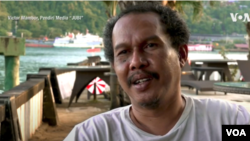Journalist associations in Indonesia are demanding greater efforts to protect media from attacks after a bombing outside the home of an investigative reporter.
Victor Mambor, the editor of the Papua news outlet Jubi, was at home watching television around 6 a.m. local time Monday when he heard a motorbike stop outside his home in Jayapura City.
Shortly after he heard the motorbike drive off, “there was an explosion,” he told VOA.
At first, Mambor said, he stayed indoors but he could hear a crowd starting to gather.
“I finally came out and smelled a strong odor of sulfur and heavy smoke. I noticed this was not from a firecracker but from something that was intentional,” the journalist said.
The explosion went off only a few meters from his house. Mambor said he found remnants of explosives, including burned plastic, stove wicks and asbestos fibers.
Security footage from cameras the journalist has installed at his house showed the motorbike stopping outside the home, according to local media associations.
Local police are investigating the incident. But in the wake of the attack, the Alliance of Independent Journalists (AJI) called on Indonesia’s Press Council to form an anti-violence task force to investigate incidents that target journalists.
The Press Council, an independent body whose members are appointed by the government, is mandated to protect media from interference, to oversee ethics and to resolve complaints about coverage.
"We hope the Press Council can form a task force against journalist violence related to this case, because this is on a scale that is life-threatening enough," said Sasmito Madrim, chair of the AJI.
Madrim told VOA he thought the task force should focus on attacks directed at Mambor.
“The Press Council needs to be on the field to gather information and coordinate with authorities in Papua, including at the national level,” said Madrim. “This has to be the starting point so that cases of violence against journalists in Papua can be taken to court.”
Threats, then car damage
In April 2021, assailants vandalized Mambor’s car, smashing the windscreen and spraying it with orange paint. In the lead-up to that case, the journalist said he had received threats.
He has also been doxed and harassed online over his news coverage for Jubi.
But this time, the journalist said, “I received no threats” before the bombing.
Mambor is an award-winning journalist known for his coverage of human rights violations in Papua and West Papua, including the 2022 trial of military members accused of killing and mutilating citizens; the killings of civilians by a rebel group in Gunung Bintang; and an incident in 2014 where security forces opened fire on protesters in Panai.
Since becoming a journalist in 1996, he has contributed to several foreign and local media groups and is a founder of the media outlet Jubi.
Ahmad Fathanah Haris of Indonesia’s Legal Aid Center for the Press said that police should work quickly to catch the perpetrators and determine if the attack was related to Mambor’s work.
“Whether or not this is related to his journalistic work, they must apprehend who did this. We will know then whether his work is the motive behind this or not, because a bomb terror is like a criminal act,” he said.
If someone has a complaint about reporting, they can go to the Press Council, said Fathanah Haris. He warned that if the attack on Mambor went unresolved, it could result in something similar happening again.
The AJI criticized the response by police, saying they had failed to act when the association reported two previous incidents related to the journalist.
A lack of accountability is damaging to Papua’s media freedom record, Madrim said.
"This will further exacerbate the climate for press freedom in Papua, if these cases are increasingly ignored by the police," he said.
Indonesia in 2022 fell three places on the Press Freedom Index compiled by Reporters Without Borders. It currently ranks 117th out of 180 countries, where 1st shows the best environment for media.
Journalists investigating corruption or environmental issues related to large private interests are at risk of violence and intimidation, the media watchdog said.
This story originated in VOA’s Indonesian Service.
